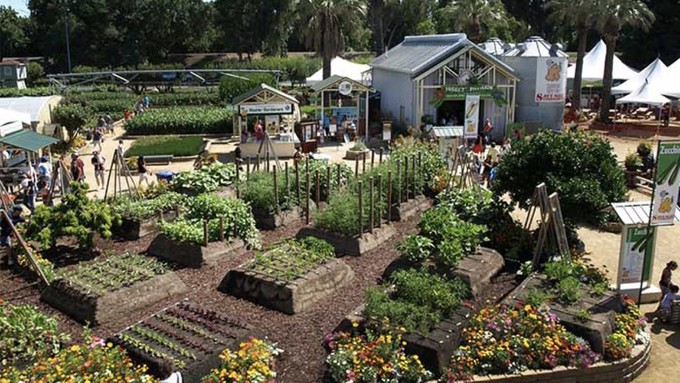
Emphasis will be on food with return of festival; visit master gardeners at The Farm

The Farm features dozens of crops grown in California as well as the Insect Pavilion and the UCCE Sacramento County master gardeners' booth. Photo courtesy California State Fair
What’s happening down on The Farm? Find out when the California State Fair and Food Festival returns Friday for its annual agricultural celebration of the Golden State.
From July 14 through 30, the fair will fill Cal Expo with such traditional favorites as nightly concerts and livestock exhibitions. With an emphasis on food, dozens of creative food vendors will participate in the fest, which includes a competition for Best Fair Food. (The 2022 Best of Fair winner: Country Fair Cinnamon Rolls’ Caramel Crunch Cinnamon Roll.) In addition, cooking challenges and demonstrations will be held daily.
Also back this summer is the 3-1/2-acre California State Fair Farm, a growing display of California’s top crops. More than 70 California-grown crops are featured along with water-wise tips and gardening advice.
Once again, the UC Cooperative Extension Master Gardeners of Sacramento County will be stationed at a booth in the middle of The Farm to answer patrons’ questions.
Our expected heat this weekend has already taken a toll on the State Fair’s schedule. The State Fair’s thoroughbred horse racing meet, a fair staple for generations, was supposed to open Friday afternoon. But with an excessive heat watch in effect through Monday night, racing for Friday, Saturday and Sunday has been canceled. Instead, racing will start on July 21.
Friday’s high temperature is expected to be 106 degrees, says the National Weather Service. Saturday’s forecast high is 110 degrees; Sunday, 108.
Cal Expo is located at 1600 Exposition Blvd., Sacramento. Fair hours are 11 a.m. to 10 p.m. Mondays-Thursdays; 10 a.m.-10 p.m. Fridays-Sundays. Online advance admission tickets are $16. Senior admission (age 62 and up) is $12. Youth admission (ages 5-12) is $10. Children age 4 and younger admitted free. Parking: $15.
Details and advance admission tickets: https://calexpostatefair.com/
Comments
0 comments have been posted.Sacramento Digs Gardening to your inbox.
Food in My Back Yard Series
May 6: Maintain soil moisture with mulch for garden success
April 29: What's (already) wrong with my tomato plants?
April 22: Should you stock up on fertilizer? (Yes!)
April 15: Grow culinary herbs in containers
April 8: When to plant summer vegetables
April 1: Don't be fooled by these garden myths
March 25: Fertilizer tips: How to 'feed' your vegetables for healthy growth
March 18: Time to give vegetable seedlings some more space
March 11: Ways to win the fight against weeds
March 4: Potatoes from the garden
Feb. 25: Plant a fruit tree now -- for later
Feb. 18: How to squeeze more food into less space
Feb. 11: When to plant? Consider staggering your transplants
Feb. 4: Starting in seed starting
Sites We Like
Garden Checklist for week of May 11
Make the most of the lower temperatures early in the week. We’ll be back in the 80s by Thursday.
* Plant, plant, plant! It’s prime planting season in the Sacramento area. Time to set out those tomato transplants along with peppers and eggplants. Pinch off any flowers on new transplants to make them concentrate on establishing roots instead of setting premature fruit.
* Direct-seed melons, cucumbers, summer squash, corn, radishes, pumpkins and annual herbs such as basil.
* Harvest cabbage, lettuce, peas and green onions.
* In the flower garden, direct-seed sunflowers, cosmos, salvia, zinnias, marigolds, celosia and asters. (You also can transplant seedlings for many of the same flowers.)
* Plant dahlia tubers.
* Transplant petunias, marigolds and perennial flowers such as astilbe, columbine, coneflowers, coreopsis, dahlias, rudbeckia and verbena.
* Keep an eye out for slugs, snails, earwigs and aphids that want to dine on tender new growth.
* Feed summer bloomers with a balanced fertilizer.
* For continued bloom, cut off spent flowers on roses as well as other flowering plants.
* Add mulch to the garden to maintain moisture. Mulch also cuts down on weeds. But don’t let it mound around the stems or trunks of trees or shrubs. Leave about a 6-inch-to-1-foot circle to avoid crown rot or other problems.
* Remember to weed! Pull those nasties before they set seed.
* Water early in the day and keep seedlings evenly moist.